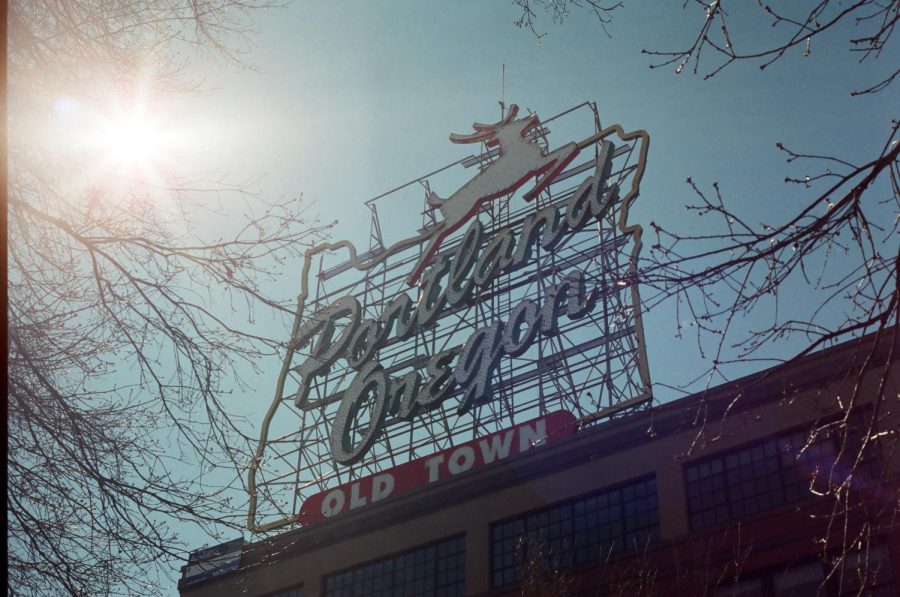Could Republicans have the solution to Portland’s crises?
June 5, 2023
Portland, over the past decade, has had a huge fall from grace. From 2018, the city went from the sixth best city to live in,according to the U.S. News & World Report, and now sits at 36th place. Sure, these lists may be subjective, but falling 30 places in just five years is nothing to joke about.
Portland is a city in crisis, and is in dire need of solutions. Many people have ideas, and many of these ideas have been tried. But some have yet to be explored, mainly ideas put forward from Republicans. But how viable might these options from the right wing really be? Are they the solution to Portland’s numerous crises, or would they only make things worse?
So, what are these issues that are facing Portland? Well, quite a few. The most notable ones are homelessness, drug use, and increasing violence. Though, there are many more than just these three. However, these three stand out above the rest, and are at the forefront of the arguments against Portland. Many proposals, bills and acts have been tested, but things still have only seemed to get worse these past few years. While more and more of these ideas are being put forward, some blame the city’s Democratic leadership.
This begs the question, what do the Republicans want to bring to the table? Oregon Republican, and 2022 gubernatorial candidate, Christine Drazan said in an interview with OPB, “Instead of enabling homelessness we must balance our approach with a mindset of both compassion and accountability.” Drazan blames the state’s leadership. “The state has failed to support Oregonians suffering from substance abuse and mental health issues.” She also blamed former Oregon House Representative, and current Oregon Governor, Tina Kotek, for pushing forward a bill which “effectively legalized tent camping,” saying it enables homelessness.
Drazan’s plan to get rid of the homeless crisis focuses a lot on addiction and mental health services. “Shelter options that provide case management as well as mental and behavioral health services with a focus on addiction treatment and long-term recovery are critical.” But, according to a 2019 study from A Home For Everyone, in Portland alone 38.5% of homeless people say they have some sort of mental illness, and 37.2% say they struggle with substance abuse. While these numbers have likely changed over the past four years, they still go to show that the majority of the homeless population in Portland doesn’t struggle with mental health issues or substance abuse, and shows that there is a good amount of homeless people that are on the streets due to housing affordability and availability. Though, that doesn’t mean these resources wouldn’t be very beneficial to a good majority of the homeless population, and just in general. But, they are by no means enough to reach Drazan’s vision of making homelessness a “functional zero,” and is “rare and temporary.”
So Drazan’s plan to focus primarily on addiction and mental health support would not nearly encompass all of the homeless population of Portland. Though, Drazan’s idea to push for more temporary housing with more access to care services for those who need it, would be beneficial, just maybe not enough to the degree she is pushing for –which is to make homelessness a “functional zero,” meaning it is “rare and temporary.”
Another massive issue is the drug problem in Portland, which does tie into homelessness as well. Drazan believes that Measure 110, which decriminalized hard drugs, was “a mistake for Oregonians.” Supporters of Measure 110 point to other countries that have tried similar laws. The Turning Point of Tampa says that statistics from countries which have decriminalized have seen the rate of drug use or crime didn’t increase, rate of addictions, overdoses and AIDS/HIV has sharply decreased, and more people went into drug treatment programs. One such country is Portugal. Since decriminalization in 2001 to 2017, Portugal saw a 80% decrease in drug related deaths, Incarceration for drug related offenses dropped 40% and the amount of new cases of AIDS/HIV attributed to drugs dropped from 52% of new diagnoses to a mere 6%. But the difference here is that Portugal was ready for the transition to a whole new system, while Oregon was not, and did so with less prep. But at this point, is it worth it to wait on the system to work?
According to a 2023 study done by WalletHub, Oregon ranks fourth nationally for percent of adult drug users. Since measure 110 was introduced in 2020, it has helped around 60,000 people, but has seen an increase in opioid deaths. KGW interviewed David Castle, a person struggling with homelessness in The Dalles, in response to being asked if Measure 110 made it easier to get and stay addicted, Castle said, “You don’t get in trouble for using drugs, oh yeah, a lot easier.” Even though measure 110 has helped so many, statements like the one from Castle if the bill is really working as intended.
Removing Measure 110 would mean making hard drugs illegal again. This means that people wouldn’t have access to begin with, or continue to abuse drugs since there would be new legal pressure. But, for those who do try regardless of the law, as well as those who already have an addiction, will be arrested and put into jail — which does not solve the problem. Numerous studies from different organizations, including the National Institutes of Health, says that, “Imprisonment, whether for drug or other offenses, actually leads to much higher risk of drug overdose upon release,” and that “More than half of people in prison have an untreated substance use disorder, and illicit drug and medication use typically greatly increases following a period of imprisonment.” This means the plan to remove Measure 110 wouldn’t exactly fix things either; there needs to be a new policy of some sort since Measure 110 isn’t working as intended, but removing it would only be worse.
The third major problem facing Portland is an increase in violent crimes, and crimes as a whole. 97 homicides were reported in 2022, this is up from 36 in 2019. Shootings have tripled. There were 11,000 carjackings in 2022, coming from 6,500 in 2019. These are just a few statistics from the numerous increases in all kinds of crime throughout the city of Portland. These crimes have also been blamed on a lack of action from Democrats by Republicans at a local, state, and even national level, with notable figures like Speaker of the House Kevin McCarthy giving words about the state of Portland. “Do you have the same economic factors that you had before? The answer from every data point is no, and why? Because of crime and what it has led to,” McCarthy said. The Republican solution to this problem would be to increase the size of the police force and be stricter on enforcement of the law.
Another former candidate for governor and mayor of Sandy, OR, Stan Pulliam, said his plan to “clean up our streets” would be to increase the size of the state police and call on the National Guard to help. While having more police to respond to crimes does sound nice in theory, in reality, it’s not that easy. Morgan C. Williams Jr., an economist at New York University, along with colleagues, found that the average city would need to hire around ten to 17 police officers to save one life per year. With 96 lives lost in 2022 alone, using the numbers given, it would take 960 to 1,632 new police officers to help save these lives.
The current number of patrol officers in Portland is only 281, and even taking the number of all sworn members of the Portland Police Bureau (PPB), that only encompasses 805 people. This means by the statistics given, the PPB would have to more than double in size. Though, these numbers are purely hypothetical, and nothing guarantees that adding more police officers would stop homicides. In some cases this could even make things worse for people, especially for people and communities of color who could start experiencing more arrests for low level crimes, and ruining those lives.
There are so many other problems facing Portland, but these tend to be the ones front and center in the conversations and the ones ruining the city’s reputation the hardest. While the efforts from the Democrats have not succeeded in saving our city, the ideas put forth by Republicans, all while seeming appealing at face value, also carry with them similar, and sometimes worse issues.
What needs to happen is work from both parties to help save this city. Neither side’s solutions have worked, or would work. Politicians need to look and try things that have worked elsewhere, and when they do, do it well. Measure 110 is a prime example of this, it worked in Portugal, but is failing in Oregon due to a lack of proper funding, and not enough enforcement. But when Oregon’s politicians can find a way for it to work, that’s when change could, and would, begin to happen. But until bipartisan work begins and Oregon begins doing these sorts of things right, Portland, and cities like it, will continue to suffer.




miles (perchance) • Jun 5, 2023 at 1:46 pm
Great analysis, props to the politically objective reporting on the part of Mr. Dennis.